Top 10 AI RFP Tools for Legal RFP Workflow
If you have ever spent hours combing through clauses, redlining documents, or verifying compliance details before an RFP deadline, you already know how demanding legal RFPs can be. Between tight timelines, confidentiality requirements, and endless revisions, even a small oversight can cost you a major deal.

If you have ever spent hours combing through clauses, redlining documents, or verifying compliance details before an RFP deadline, you already know how demanding legal RFPs can be. Between tight timelines, confidentiality requirements, and endless revisions, even a small oversight can cost you a major deal.
Here’s a reality check: Gartner surveyed legal leaders across industries and found that over 60% are prioritizing improvements in third-party and extended enterprise risk management in 2026. Yet, many legal teams are still dependent on manual workflows that make it nearly impossible to meet this priority. Each RFP response means managing compliance checks, verifying contract clauses, and coordinating with multiple departments, all prone to delays and human error.
This is where AI RFP tools make a real difference. By automating drafting, compliance validation, and collaboration, they help you move faster, reduce risk, and respond with precision. This article explores the top AI RFP tools for legal RFP workflows and how they can help you deliver accurate, compliant proposals without burning through valuable time.
Key Takeaways
- Legal RFPs are complex and time-sensitive, demanding accuracy, compliance, and coordination across departments.
- AI RFP tools automate drafting, compliance validation, and collaboration, reducing manual effort and human error.
- Inventive AI leads the market with context-aware drafting, conflict detection, and a centralized knowledge hub.
- Competing tools like Loopio, DeepRFP, and AutoRFP AI lack advanced compliance control and legal-grade precision.
- For legal teams seeking faster responses, fewer errors, and higher win rates, Inventive AI is the clear choice.
Understanding the Legal RFP Workflow
Responding to a legal RFP is rarely a quick task. Each request demands careful documentation, airtight compliance, and collaboration across multiple departments. What looks like a set of questions often turns into a complex project involving hundreds of pages of data, contracts, and supporting documents.
Here’s how the legal RFP process usually unfolds:
- RFP Intake and Qualification: You begin by reviewing the client’s request to understand eligibility, scope, and legal requirements. This is where you assess risks, conflicts of interest, and whether your firm can meet specific compliance standards.
- Cross-Department Collaboration: Legal RFPs require input from multiple functions, finance, compliance, IT, and data privacy. Gathering updates over long email threads or spreadsheets can slow things down and create confusion.
- Drafting and Review: Drafting responses involves addressing complex legal questions, referencing prior work, and ensuring every statement reflects your firm’s expertise. Each round of review adds to the time pressure.
- Compliance Checks: Every clause, disclosure, and statement is required to comply with regulations like GDPR or HIPAA. Manual checks can easily miss outdated content or small inconsistencies that affect accuracy.
- Submission and Tracking: Once the proposal is finalized, it needs to be formatted, approved, and submitted on time. Managing multiple deadlines across clients often becomes a juggling act.
When done manually, this process can feel repetitive and chaotic, with multiple versions of the same file, unclear updates, and missed edits. AI RFP tools simplify this entire workflow by creating drafts faster, managing all content in one place, and flagging compliance issues before submission.
Also read: How to Write an Effective RFP Response
Pro Tip: Keep all your approved legal templates, past responses, and compliance documents in a single knowledge hub. It makes finding accurate information quick and helps you maintain consistency across every RFP.
Why Legal Teams Need AI in RFP Management
Responding to legal RFPs is not like handling any other business proposal. You deal with complex compliance questions, strict confidentiality requirements, and multiple departments weighing in before submission. Each response can involve hundreds of security, privacy, and regulatory details, all while you are racing against tight deadlines.

Here are some of the biggest challenges legal teams face, and how AI helps solve them:
1. Managing High-Volume Compliance and Security Questions
Legal RFPs often include extensive questionnaires covering areas such as:
- Data privacy (GDPR, HIPAA, CCPA)
- Information security certifications (SOC 2, ISO 27001, FedRAMP)
- Confidentiality and attorney–client privilege
- Operational risk and business continuity
Manually answering these questions is slow and risky. You might reuse outdated clauses, overlook small compliance updates, or spend hours searching for the right approved content.
AI RFP tools eliminate that guesswork, automatically matching questions with the latest approved answers, flagging inconsistencies, and ensuring every submission meets current standards.
2. Aligning Legal, Sales, and Proposal Teams
Winning legal RFPs requires collaboration across multiple departments.
- Sales teams focus on crafting persuasive narratives.
- Proposal managers handle timelines, structure, and formatting.
- Legal counsel ensures every clause meets compliance and confidentiality requirements.
When these groups work in silos, you risk missed deadlines, duplicated work, and conflicting edits.
AI-powered RFP platforms bring everyone together in one workspace, allowing parallel workflows, legal can review compliance while sales refine messaging. This alignment helps teams respond faster, maintain accuracy, and present a unified proposal.
3. Avoiding the Pitfalls of Manual RFP Management
Outdated, manual processes can easily derail an RFP response. Some of the most common issues include:
- Teams working on different document versions
- Missed compliance obligations due to manual reviews
- RFP cycles stretching from two weeks to more than a month
- Loss of client confidence from inconsistent answers
AI RFP software solves these challenges by creating structured, ready-to-review drafts, keeping all approved content organized in one secure workspace, and automatically highlighting outdated or conflicting information. The outcome is a smoother review process, faster approvals, and proposals that consistently meet both compliance and client expectations.
Remember to start small, automate one part of your RFP process, like content search or compliance validation. Once you see how much time it saves, scaling AI across your full workflow becomes an easy next step.
Top AI Tools for Legal RFP Workflow
Inventive AI
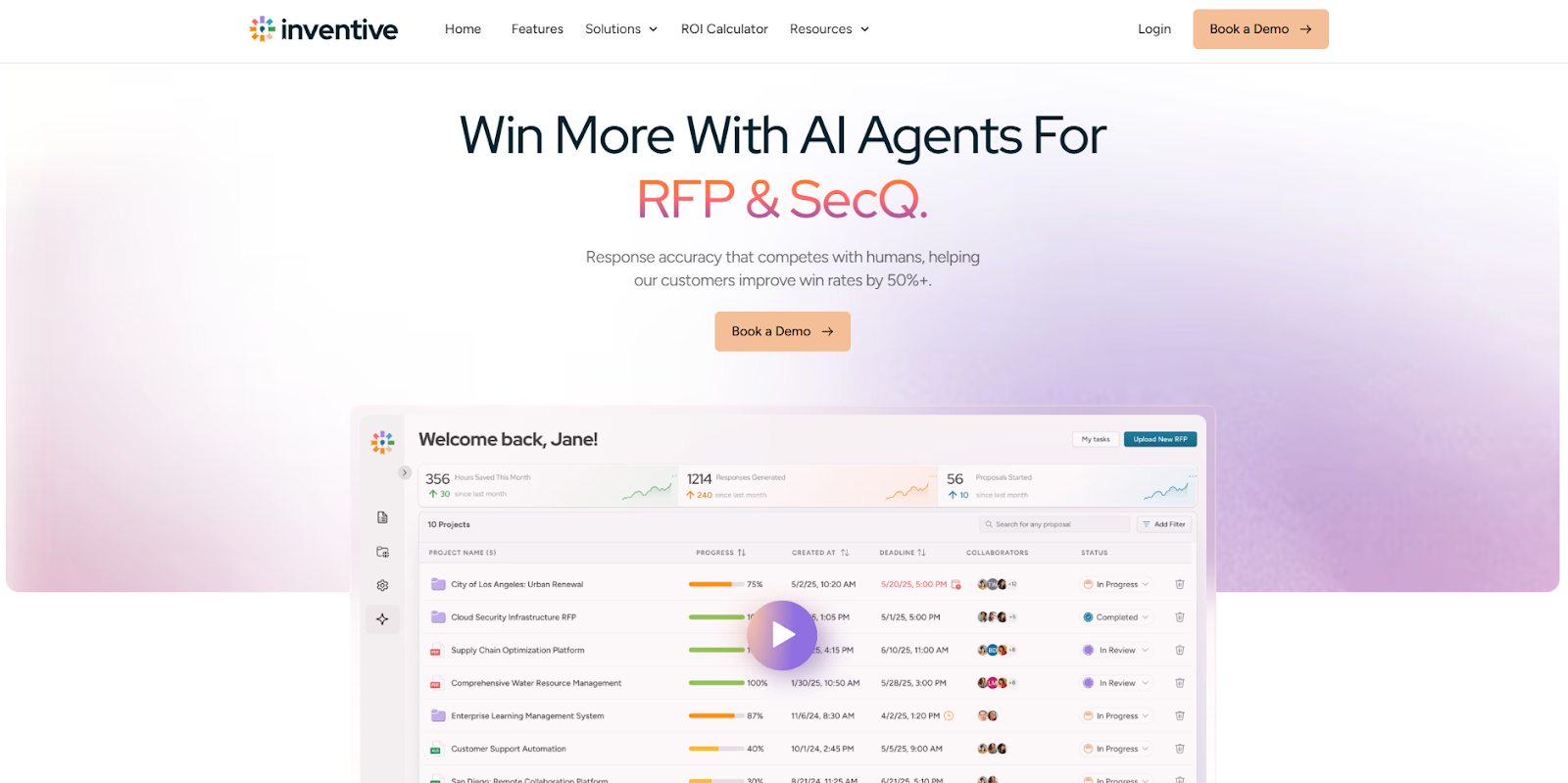
Inventive AI is built for hyper-contextual, legally accurate RFP responses with real-time content integrity. It connects your prior responses, legal disclosures, and policy docs into one source of truth, then drafts precise answers that reflect your tone, compliance posture, and buyer requirements. You get governed content, faster cycles, and persuasive proposals that actually speak to legal evaluators, without the copy-paste fatigue.
Key Features
- 2x usable answers with only minor tweaks
- Best in industry for customization (policies, clause sets, tone, review rules)
- Only platform that answers value statements (not just facts) with Win Themes and gap-filling
- Centralized knowledge hub with AI content conflict/staleness detection
- Collaboration across Legal, Sales, Security, Finance with role-based control
Pros
- Built for compliance-heavy legal RFPs and security questionnaires
- 90% faster responses, 50% higher win rate, 95% accurate responses (reported by customers)
- 0% hallucinate stance with governed sources and conflict flagging
- Works across small, mid, and large teams; proven for technology, healthcare, finance, government, manufacturing, and professional services
Cons
- Limited analytics (advanced BI dashboards still developing)
Best For
- Enterprise legal vendors responding to multi-jurisdiction RFPs
- Security/privacy questionnaires at scale (SOC 2, ISO 27001, HIPAA, GDPR)
- Cross-functional proposals needing strict version control
- Firms standardizing a single, fresh library across regions and practices
- High-volume RFP engines aiming for measurable cycle-time reduction
Gartner Rating: 5/5
If you want 50% higher win rate, 90% faster responses, 2x higher response quality than top RFP software, 70% higher efficiency, and 60% responses that need no edits, Inventive AI is the safest bet for legal-grade accuracy and speed, best choice right now for mid and large enterprises, and adaptable for smaller teams too.
DeepRFP
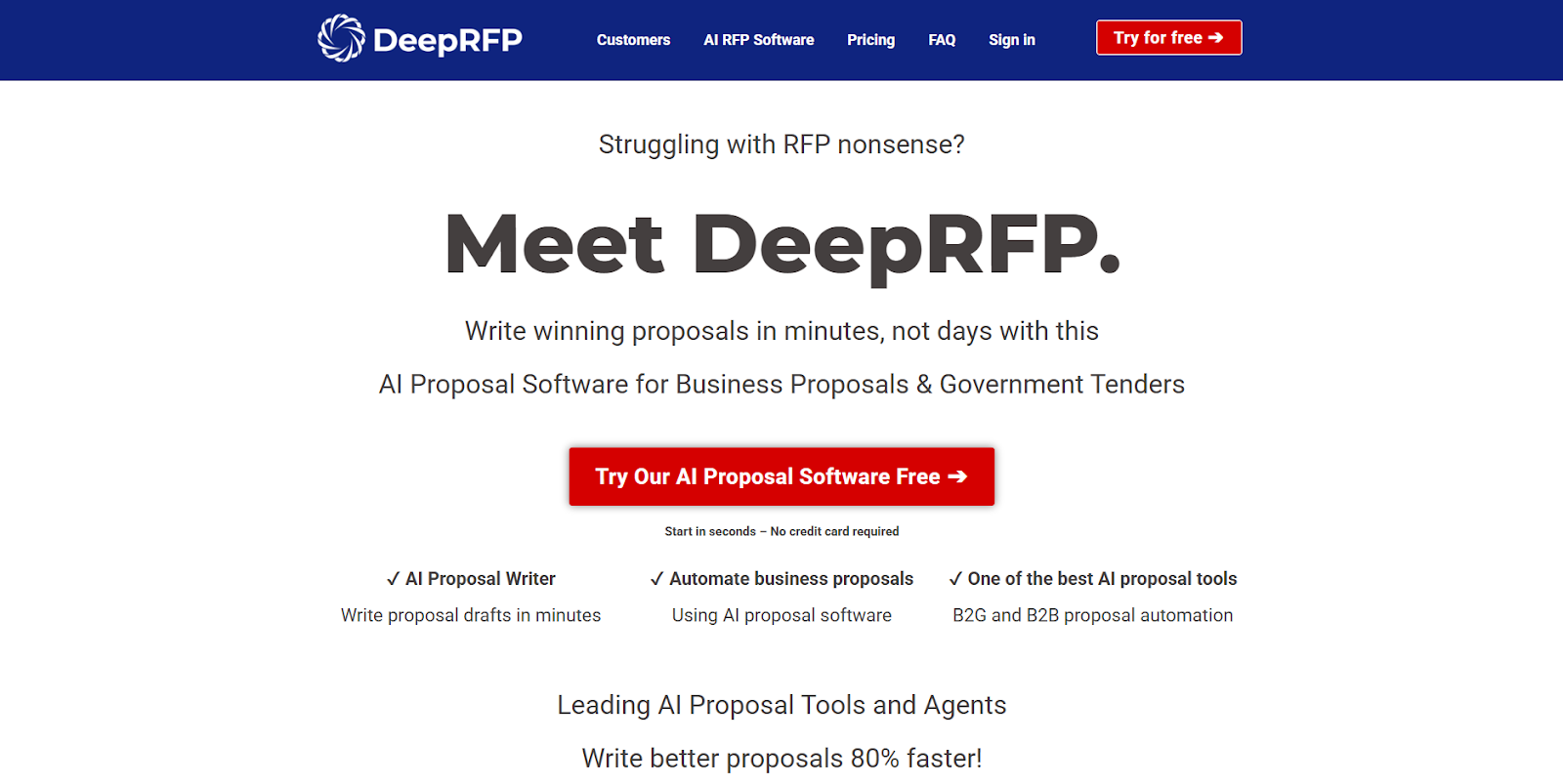
DeepRFP offers AI-assisted proposal and RFP drafting with a lightweight library and a focus on quick turnaround. It’s suited to smaller bids and teams who want speed. But it lacks the deep clause-level governance, compliance controls and review workflows that legal teams require for high-stakes, regulated RFPs.
Features:
- AI draft generation
- Answer library reuse
- Light collaboration tools
Pros:
- Quick to start and easy to use
- Budget-friendly for smaller teams
Cons:
- Struggles with contextual awareness in complex legal/regulatory responses
- Weak detection of outdated or conflicting content
- Limited workflows for multi-department reviews
Gartner Rating:
DeepRFP can serve nicely for simpler or lower-risk proposals, but when you must manage compliance, detailed clauses, varied departments and legal risk, it falls short of delivering full legal-grade confidence.
Loopio

Loopio is a well-established RFP response platform built around a content library and collaboration tools, trusted by many enterprises for managing standard RFPs. But when it comes to complex legal questionnaires, dense compliance demands and advanced AI-drafting, its capabilities are thinner and require more manual effort.
Features:
- Central content library with tagging
- Assignment and approval workflows
- Integrations with common enterprise tools
Pros:
- Familiar user interface and wide adoption across teams
- Good foundational library and collaboration structure
Cons:
- Library drift without robust AI governance or stale content detection
- Limited support for dense security or legal Q&A requiring nuanced responses
- Frequent manual edits needed to reach the level of legal accuracy you need
Gartner Rating: 4.4/5
Loopio is solid for managing traditional RFP content reuse and collaboration, but for legal-heavy workflows you’ll still need to invest heavily in manual review and upkeep.
Suggested Alternative: Inventive AI
Inventive AI goes beyond Loopio’s manual library approach with AI that automatically detects outdated or conflicting content and keeps every response accurate. With features like Win Themes and a centralized knowledge hub, Inventive AI helps you create precise, compliant, and persuasive legal RFP responses much faster.
Responsive (formerly RFPIO)
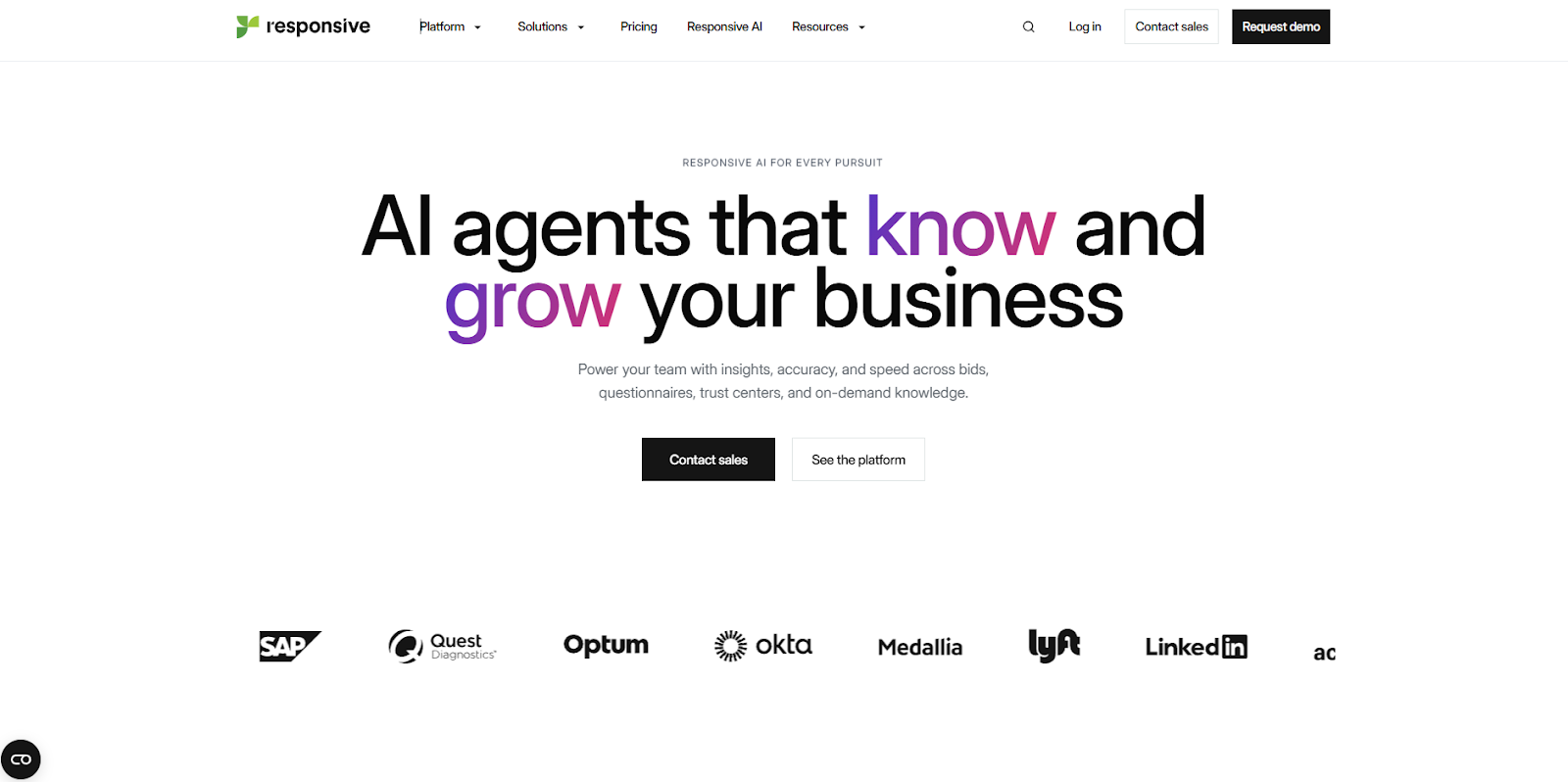
Responsive is an end-to-end RFP workflow platform that covers questionnaires, approvals, content reuse and collaboration across teams. But it lacks the deep legal-specific AI, governance around clauses, and context strength that legal-heavy RFPs demand.
Features:
- Workflow and project management
- Content library reuse
- Automation of questionnaire responses
Pros:
- Broad toolset and well-deployed across large organizations.
- Easy to implement with solid support and user adoption.
Cons:
- Often produces generic answers needing heavy SME edits.
- Governance and conflict/stale content detection are limited.
- Formatting and advanced review controls (legal/regulatory clauses) are weaker in practice.
Gartner Rating: 4.3/5
Responsive works well for general RFP volumes and broad teams, but for compliance-heavy legal RFPs you’ll face extra work and risk that more specialized platforms manage more effectively.
AutoRFP AI

AutoRFP AI focuses on speeding up first-draft generation for RFPs and proposals. But it struggles when responses must handle compliance, legal nuance, or security questionnaire depth.
Features:
- AI-generated first drafts
- Template-based answer reuse
- Basic library of responses
Pros:
- Very fast start to proposal drafting.
- Good for lower complexity, lower risk RFPs.
Cons:
- Templates are generic, requiring significant editing for legal accuracy.
- Limited governance around clause freshness, compliance updates, or security artifacts.
- Collaboration and review workflows remain minimal compared to legal-team needs.
Gartner Rating: 4.9/5
AutoRFP AI might ease simple RFP workflows, but when you face complex legal, regulatory, or security-driven bids, the lack of depth becomes a greater burden.
Suggested Alternative: Inventive AI
Inventive AI solves the problems AutoRFP AI cannot. Instead of using rigid templates, it delivers accurate, context-aware drafts based on your approved legal and compliance content. Its AI RFP Agent manages collaboration, clause validation, and real-time content freshness checks, helping you respond to complex legal RFPs faster and with 95% accuracy.
Thalamus AI
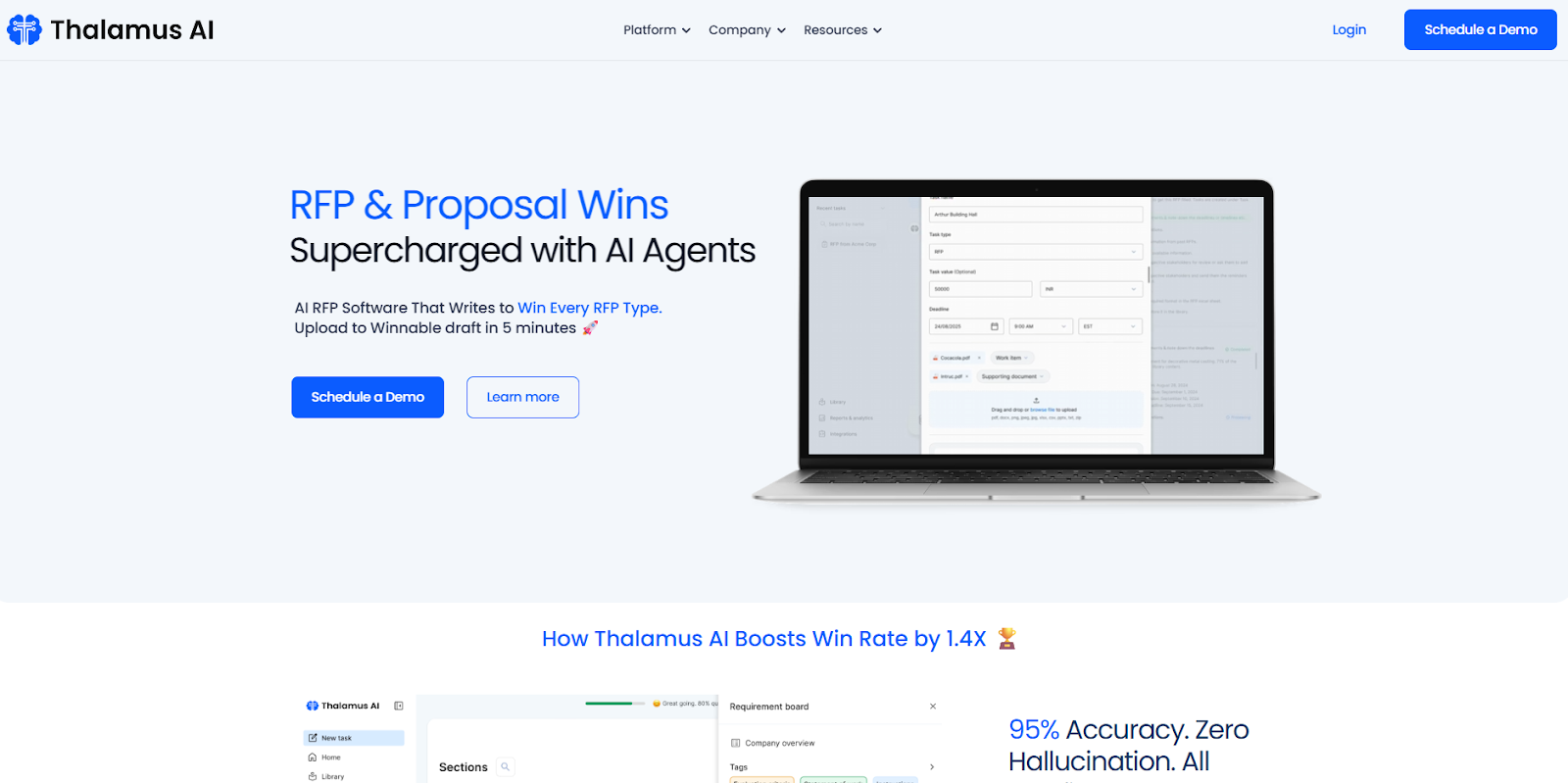
Thalamus AI offers agent-based automation for RFPs, questionnaires and bids, with a modern interface and flexible setup. But it lacks a proven track record in large legal-vendor environments and may require more integration and governance effort.
Features:
- AI agent workflows
- Questionnaire automation
- Some content library functions
Pros:
- Modern UX and forward-looking architecture.
- Flexible for organizations willing to build custom use cases.
Cons:
- Fewer enterprise legal references demonstrating compliance-heavy performance.
- Integration and support ecosystem still emerging, increasing implementation risk.
- Content governance, stale-clause detection and legal-specific workflows are weaker.
Gartner Rating: N/A
Thalamus AI shows promise for future RFP automation, but if you must meet tight deadlines and strict legal compliance now, it carries more uncertainty than mature alternatives.
QorusDocs
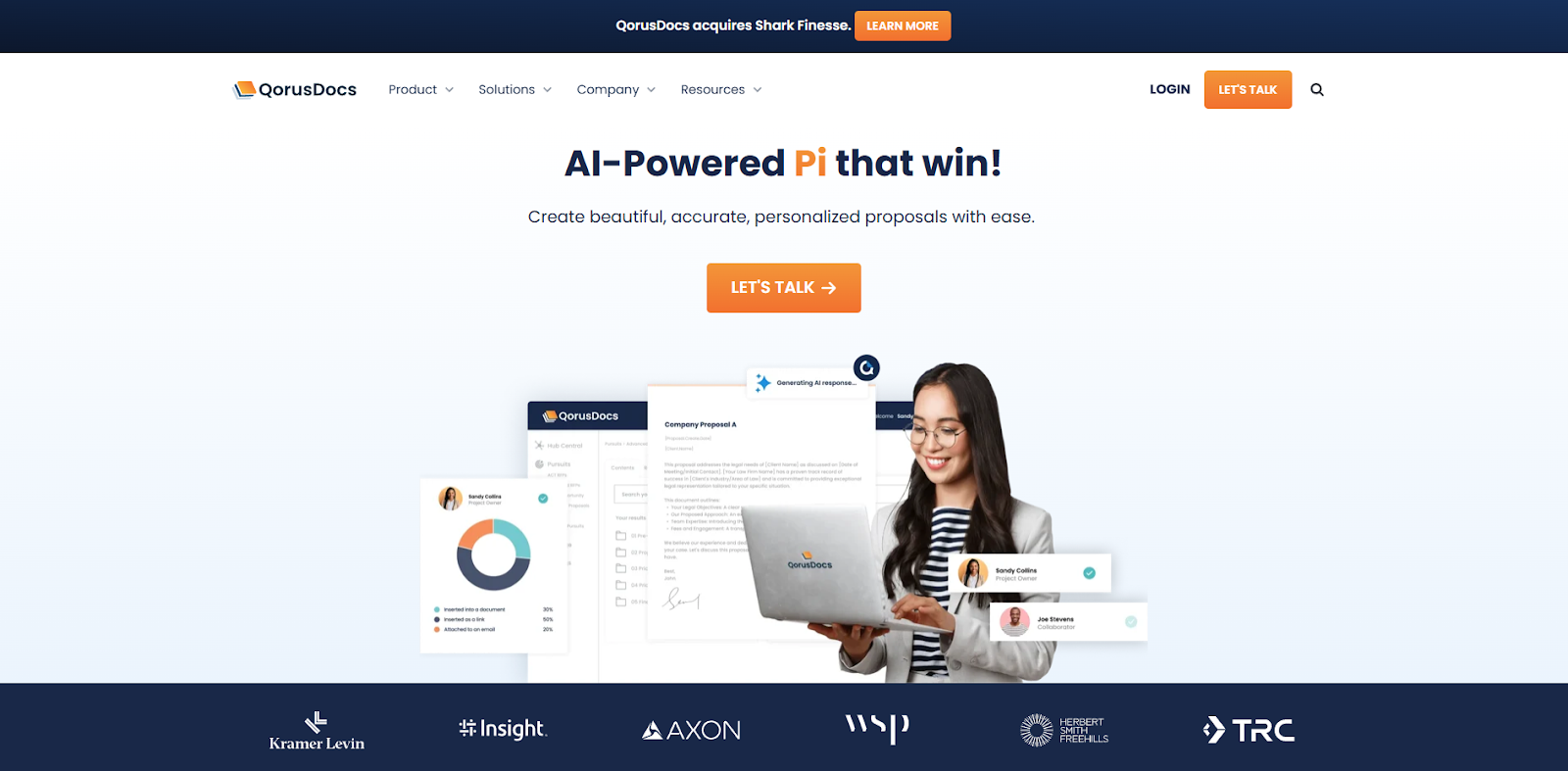
QorusDocs focuses on document automation and proposal assembly rather than full RFP response or legal questionnaire workflows. But it lacks the AI depth for managing dense compliance and legal-heavy RFPs.
Features:
- Templates and document generation
- Content reuse across proposals
- Integration with Microsoft stack
Pros:
- Good for proposal layout, packaging and semi-automated documents.
- Familiar interface for teams used to the Word/Office ecosystem.
Cons:
- AI for legal-specific content is minimal; responses often need heavy editing.
- Governing clause validity, content freshness and conflicting statements is weak.
- Not designed for dense security or regulatory questionnaire volumes.
Gartner Rating: N/A
QorusDocs is strong for document automation and assembly, but if your RFP workflow needs accuracy, compliance and AI-driven drafting for legal vendors, you will still invest heavily in manual review.
Conveyor
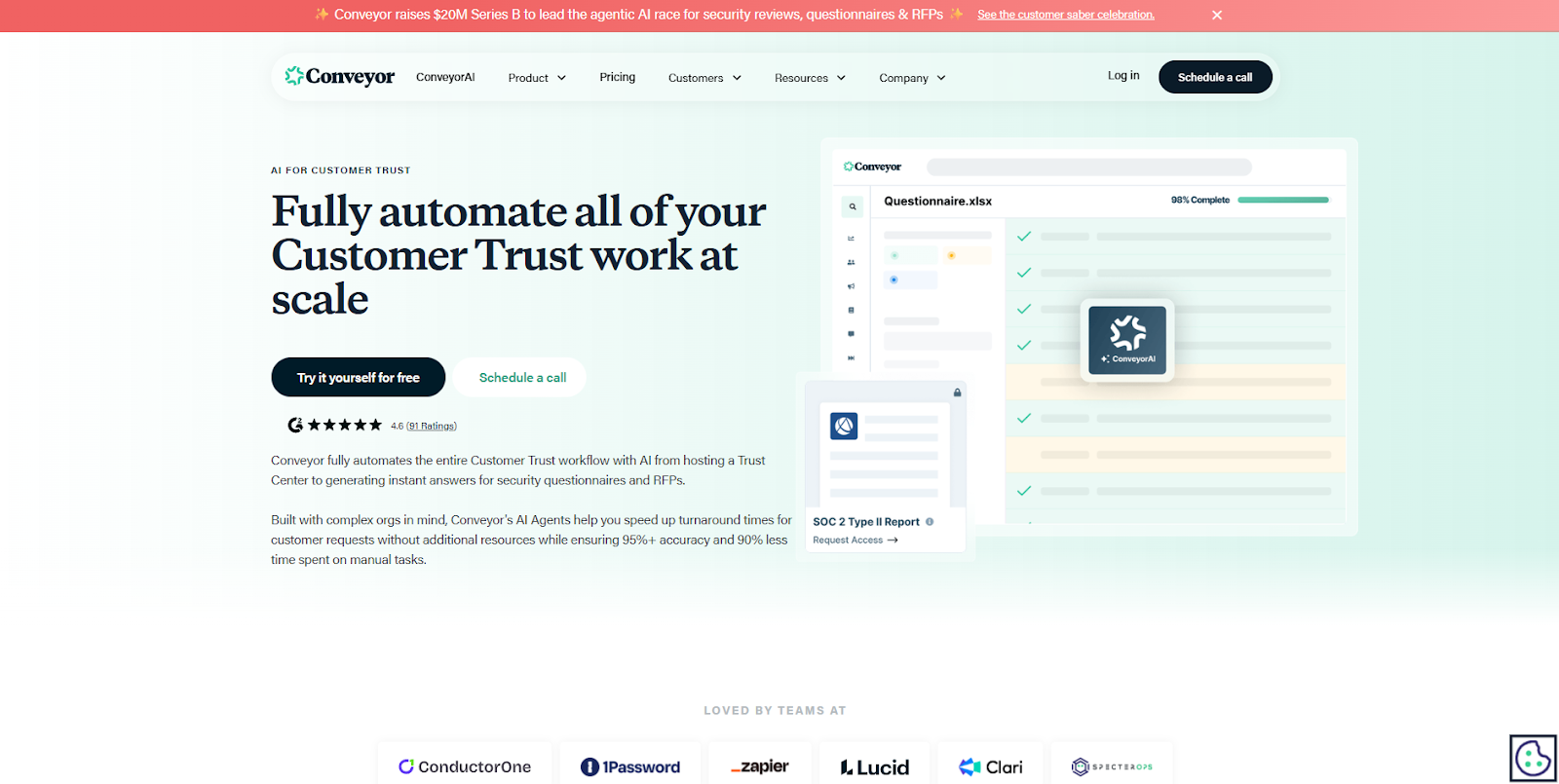
Conveyor is specialized for security questionnaires and trust portal management, excellent for sharing proofs and artifacts. But it is not built for full RFP drafting or handling complex proposal narratives.
Features:
- Questionnaire automation and evidence library
- Trust portals for sharing compliance proofs
- Artifact management and export
Pros:
- Excellent for handling SOC/ISO/third-party audit artifacts and vendor proof sharing.
- Reduces manual back-and-forth on security questionnaires.
Cons:
- Narrow focus, does not handle full RFP narrative drafting or deep response generation.
- Collaboration and content governance around proposals are weak.
- Not designed to manage end-to-end legal RFP workflows.
Gartner Rating: N/A
Conveyor serves a valuable niche (security & proof sharing) but isn’t sufficient as your main RFP solution when you need full proposal automation, legal review, compliance checks and intelligent drafting.
1up.ai
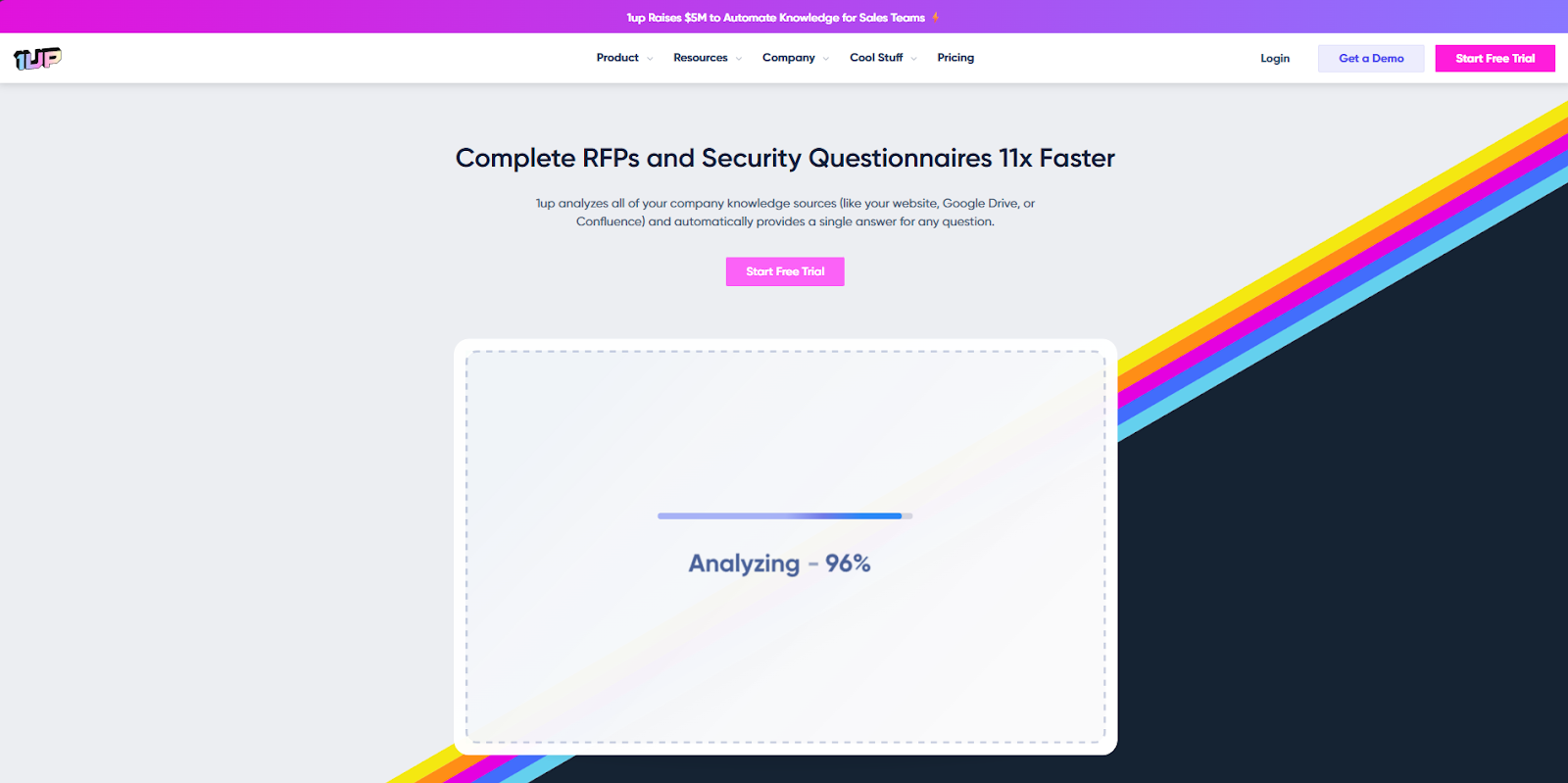
1up.ai delivers knowledge-based AI that searches across documents and suggests responses. But it lacks legal-grade governance, deep clause review, and a full workflow for proposal teams loaded with legal or regulatory demands.
Features:
- AI question-answer search across your documents
- Basic suggestion engine
- Light knowledge reuse
Pros:
- Fast to onboard; minimal training required.
- Good for internal references and quick lookups.
Cons:
- Outputs are fairly generic and often need manual editing for legal nuance.
- Governance, freshness of content and clause detection are weak.
- Collaboration and review workflows tailored for legal teams are limited.
Gartner Rating: N/A
1up.ai works for internal knowledge lookups and lighter proposal tasks, but when responding to high-stakes legal RFPs with tight accuracy requirements, you’ll find the gaps too obvious.
SafeBase
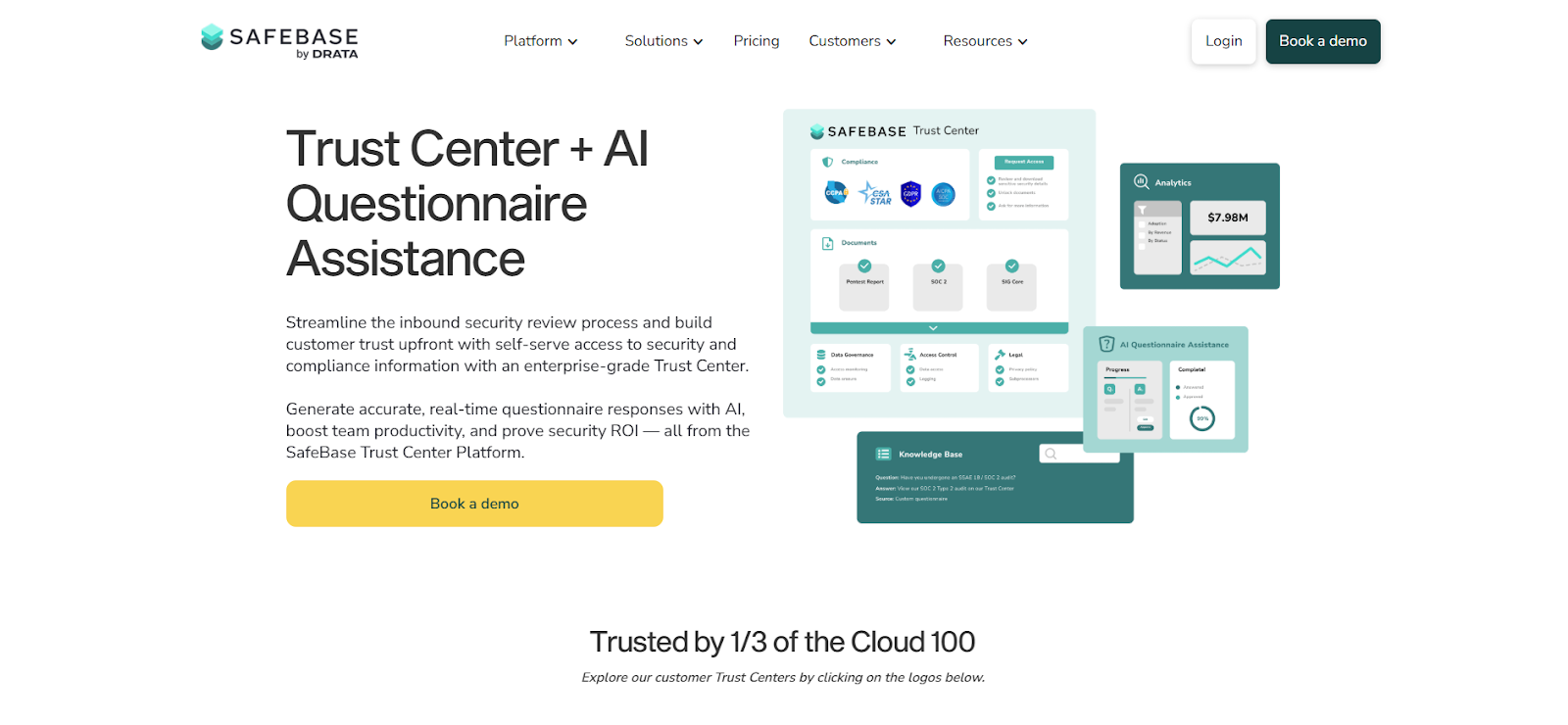
SafeBase offers a trust portal for sharing security documentation, compliance certificates and vendor artifacts. But it does not support end-to-end RFP drafting, narrative building or legal-response workflows.
Features:
- Compliance trust portal
- Evidence sharing and artifact management
- NDA gating and document access control
Pros:
- Simplifies sharing of proofs/certificates with clients and prospectors.
- Reduces email chains and manual requests for documentation.
Cons:
- Not built to draft RFP responses, narrative sections or handle complex legal question sets.
- AI composition and legal review features are minimal or absent.
- Collaboration across the full proposal team and content governance are not core functions.
Gartner Rating: N/A
SafeBase is a strong companion for vendor proof sharing and trust-artifact management, but not your primary tool if you’re seeking full automation of legal-grade RFP responses.
Inventive AI isn’t just another RFP tool, it’s the best AI-powered RFP response software for legal teams that need accuracy, compliance, and speed. Trusted by enterprises worldwide, Inventive AI helps you respond faster, win more deals, and eliminate manual rework for good.
Choosing the Right AI Tool for Your Legal RFP Workflow
Not every AI RFP tool is built to handle the unique demands of legal workflows. The right platform should help you manage compliance-heavy content, maintain document accuracy, and make collaboration easy across departments. Before investing, evaluate what truly fits your firm’s goals and workload. Here are a few factors to consider:

1. Data Security and Compliance
Always choose a platform that follows strict enterprise-grade standards such as SOC 2, ISO 27001, and GDPR. Legal RFPs involve highly confidential data, so your tool should guarantee secure document storage, controlled access, and full audit trails to protect client information.
2. Integration Capabilities
The right RFP platform should work well with the tools you already rely on, like SharePoint, NetDocuments, or Microsoft Teams. Easy integrations help your team import content, share updates, and maintain one version of truth without switching between multiple systems.
3. Accuracy and Contextual Understanding
An effective AI RFP solution should rely on your approved internal knowledge sources instead of generic databases. This ensures every response reflects your firm’s legal standards, compliance requirements, and tone of communication.
4. Collaboration Features
Look for platforms that allow real-time collaboration with role-based access, version tracking, and automated notifications. This keeps everyone, legal, sales, and compliance aligned and minimizes the back-and-forth that slows down submissions.
5. Scalability and Cost Efficiency
As your RFP volume grows, your software should grow with you. The best tools adapt to larger workloads, provide flexible pricing, and help your team maintain quality without adding unnecessary complexity or cost.
For legal vendors and law firms managing multiple RFPs at once, Inventive AI checks all these boxes. Its AI RFP Automation ensures 10x faster drafting, 95% response accuracy, and a single hub for all your legal content, making compliance management effortless.
Also read: Common AI and Compliance Questionnaire Questions
Integration Challenges and Solutions for Legal RFP Management
Selecting an AI RFP tool is only half the job. The real test is how well it fits into your existing stack, CLM, DMS, and compliance systems without adding extra work. Below are common hurdles and practical ways to handle them.
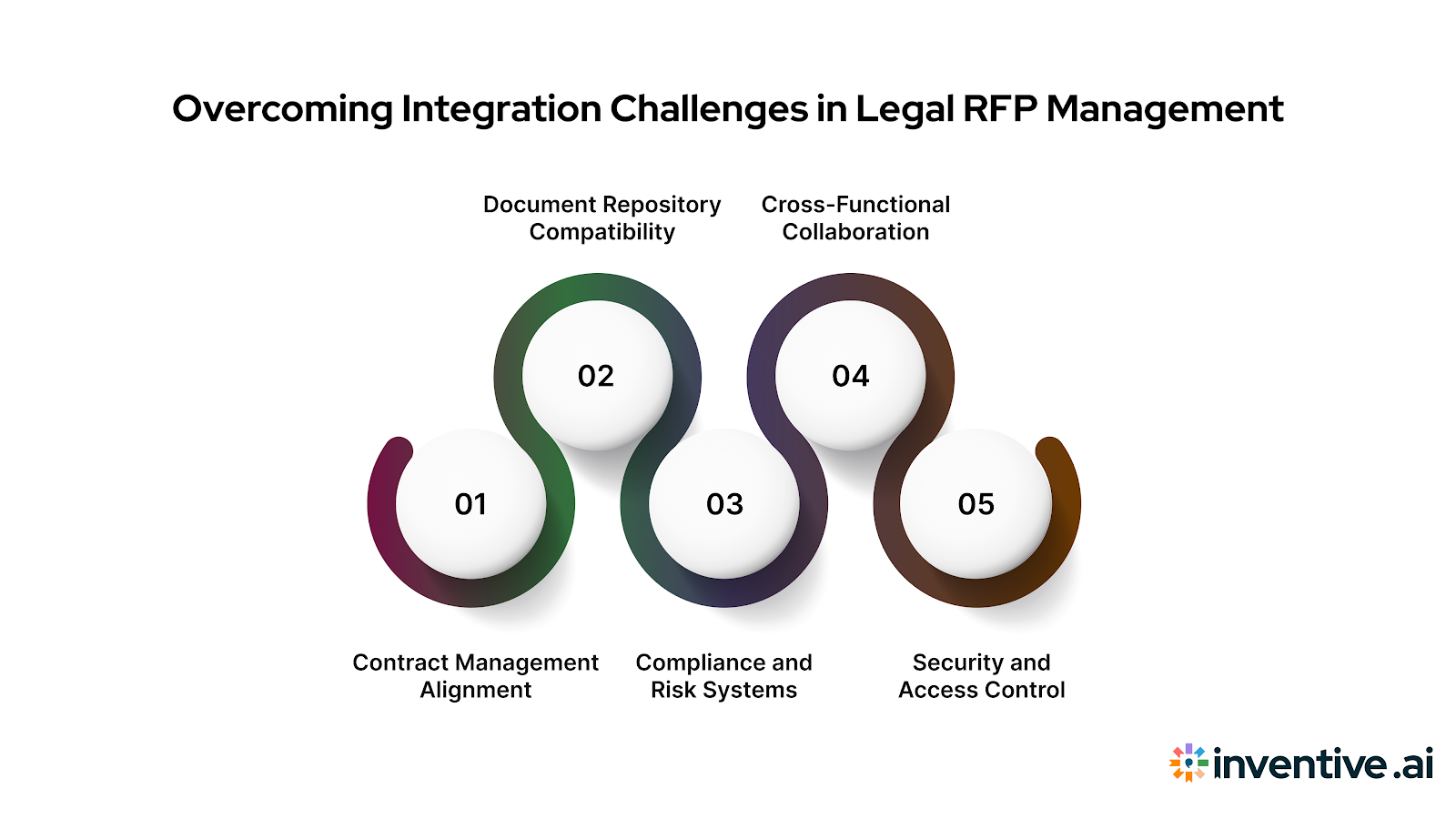
1. Contract Management Alignment (CLM)
Challenge: Duplicate entry and mismatched versions when your CLM and RFP tool don’t talk to each other.
Solution: Pick a platform with robust APIs or native connectors to your CLM. Sync key fields (parties, clause IDs, renewal terms) and lock approved clauses to reduce rework.
2. Document Repository Compatibility (DMS)
Challenge: Precedents, NDAs, and exhibits sit in iManage, NetDocuments, or SharePoint and are hard to reuse in responses.
Solution: Require direct search-and-insert from your DMS into the RFP draft, plus automatic citation of source files so reviewers can trace every clause.
3. Compliance and Risk Systems
Challenge: Outdated disclosures or missing certifications (e.g., SOC 2, ISO 27001, insurance COIs) slipping into submissions.
Solution: Connect your compliance database so the RFP tool pulls the latest attestations and flags anything expired before approval.
4. Cross-Functional Collaboration
Challenge: Legal, sales, finance, and security work in different tools; feedback gets lost in threads.
Solution: Integrate with Microsoft Teams or Slack for comment threads, mentions, and approvals tied to the exact question/answer, not a separate email chain.
5. Security and Access Control
Challenge: Sensitive client data and fee structures require stricter controls than a generic RFP tool provides.
Solution: Enforce role-based permissions across connected systems, SSO/MFA, and audit trails for every edit and export.
Strong integrations turn an AI RFP tool into a connected part of your legal workflow. When your systems, from contracts to compliance, work together, your team responds faster, reduces errors, and delivers accurate, consistent proposals.
Why Inventive AI Stands Above the Rest
When legal RFPs demand both precision and speed, Inventive AI delivers more than just automation. With features like first-draft generation that’s 10× faster, a comprehensive knowledge hub, and built-in content integrity checks, Inventive AI ensures you respond confidently with 95% accuracy.
- Context-Aware Drafts: Rather than generic responses, Inventive AI uses your actual past proposals and documents, so every answer matches your firm’s tone and compliance rules.
- Unified Knowledge Hub: All your files: RFPs, security questionnaires, spreadsheets, Slack discussions, live in one place. No more hunting through emails or drives.
- Conflict Detection for Compliance: Inventive AI identifies outdated, duplicate or conflicting content across your library so every proposal is accurate and audit-ready.
- Strategic AI Agents - Not Just Content: Beyond drafting, its agents help pull competitor insights, surface win themes, and craft responses aligned with what buyers actually evaluate.
- Real Results You Can Measure: Users report up to 50% higher win rates and response times cut by 90%.
If your legal or proposal team is facing heavy workloads, complex compliance requirements, and tight deadlines, Inventive AI offers a tool built specifically for these challenges, so you can focus on winning, not just writing.
Frequently Asked Questions (FAQs)
1. What is a legal RFP workflow?
A legal RFP workflow refers to the structured process law firms and legal teams follow to respond to client proposals. It ensures that every submission is compliant, accurate, and delivered within the required timeline.
2. How can law firms speed up their RFP responses?
You can reduce turnaround time by using AI-powered RFP tools that automate first drafts, maintain up-to-date content, and streamline collaboration between departments. This helps legal teams focus on strategy instead of manual formatting.
3. What are the biggest risks in managing legal RFPs manually?
Manual RFP management often leads to compliance errors, inconsistent contract language, missed deadlines, and difficulty tracking approvals across teams, all of which can impact client trust and win rates.
4. How can legal and sales teams collaborate better on RFPs?
Using a centralized knowledge hub allows both teams to access the same content, track edits in real time, and manage approvals efficiently. This eliminates duplicate work and ensures consistent messaging.
5. What metrics help measure RFP success?
Important metrics include turnaround time, win rate, response accuracy, and content reuse frequency. Tracking these helps you identify bottlenecks, improve response quality, and increase overall efficiency.

90% Faster RFPs. 50% More Wins. Watch a 2-Minute Demo.
Knowing that complex B2B software often gets lost in jargon, Hardi focuses on translating the technical power of Inventive AI into clear, human stories. As a Sr. Content Writer, she turns intricate RFP workflows into practical guides, believing that the best content educates first and earns trust by helping real buyers solve real problems.
Recognizing that complex RFPs demand deep technical context rather than just simple keyword matching, Vishakh co-founded Inventive AI to build a smarter, safer "RFP brain." A published author and researcher in deep learning from Stanford, he applies rigorous engineering standards to ensure that every automated response is not only instant but factually accurate and secure.


